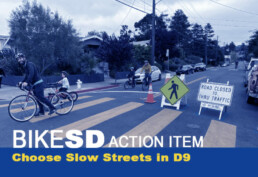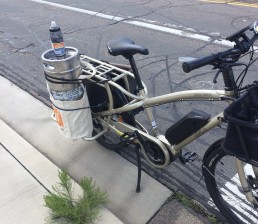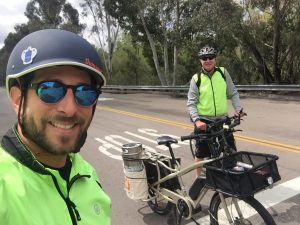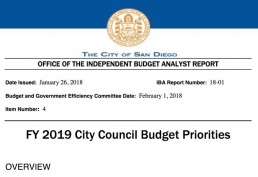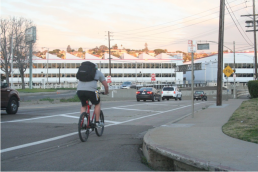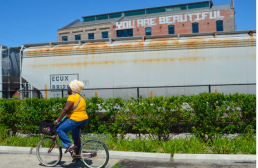District 9 Seeks Community Input for SlowStreets By May 1 Support Safer Places for People to Walk and Ride
ACTION ITEM Please fill out this form by May 1 if you live or ride in City Council District 9
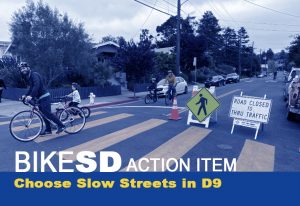 Council District 9 Slow Streets Input Form
Council District 9 Slow Streets Input Form
Click here: INPUT FORM FOR D9 SLOW STREETS
Local Cargo by Adam Deutsch
These are days where I think about how many post-apocalyptic narratives neglect the bicycle. We’re not at the end of world, but my motivation to bike came from the sense that driving made other activities almost impossible.Read more
A Quick Look at FY 2019 City Council Budget Priorities
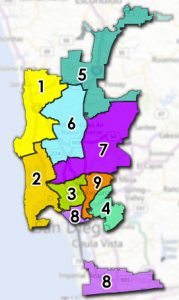 San Diego City Councilmembers submitted their priorities to the Office of the Independent Budget Analyst (IBA) in January 2019 and the IBA created a report which can be seen here: https://www.sandiego.gov/sites/default/files/18_01_fy_2019_city_council_budget_priorities_complete_report.pdf
San Diego City Councilmembers submitted their priorities to the Office of the Independent Budget Analyst (IBA) in January 2019 and the IBA created a report which can be seen here: https://www.sandiego.gov/sites/default/files/18_01_fy_2019_city_council_budget_priorities_complete_report.pdf
From the report:
"All Councilmembers indicated that support for the Climate Action Plan (CAP) is a priority in FY 2019, although no single-CAP related item was supported by a majority of Councilmembers. Budget priority memoranda included requests for adaptive traffic signals intended to ease congestion; additional staffing for the City’s Urban Forestry Program, Vision Zero program, and other CAP-related activities; a Community Choice Energy local buildout study; a mobility monitoring program to measure bicycle, pedestrian, and transit mode share; and the addition of CAP social equity metrics."

BikeSD is pleased that all Council members supported programs related to City’s Climate Action Plan and public safety including Vision Zero. But we continue to see a lack of clear direction with regard to exactly what projects should be prioritized. BikeSD Executive Director Judi Tentor spoke in favor of the Budget Priorities and encouraged Council to accelerate bicycle infrastructure projects as much as possible.
Councilmember Scott Sherman from the Seventh District was the only Councilmember who did not call out Pedestrian and Cycling Safety as a priority. All other Councilmembers cited many bicycle related infrastructure projects.
Eight Councilmembers prioritized projects in their memoranda designed to enhance pedestrian and cycling safety. A variety of requests were made as part of this priority including:
- Prioritizing funding for infrastructure improvements in the corridors identified as part of Vision Zero, especially the “Fatal 15” intersections
- Initiating traffic calming measures such as raised delineators or electronic (VCalm) signs
- Installing rectangular rapid flashing beacons, crosswalks, and constructing Safe Routes to Schools program improvements
This is good news. BikeSD will be reviewing bicycle infrastructure projects outlined in the report in the coming weeks. If we can hold the the Council to account on these projects, push for funding and accelerated timelines, we might come close to meeting our CAP goals for bicycle mode share. Maybe.
BikeSD Supports Your Journey by Bike
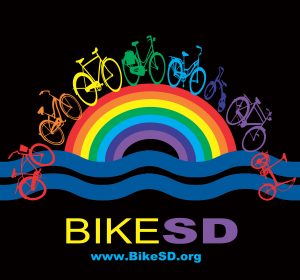 Bicycling can change the lives of people in San Diego by providing affordable and sustainable urban transportation. The number of communities benefiting from this form of transportation is growing every day, but we still have a lot to do before reaching our goal of providing safe and comfortable bicycle infrastructure in San Diego neighborhoods.
Bicycling can change the lives of people in San Diego by providing affordable and sustainable urban transportation. The number of communities benefiting from this form of transportation is growing every day, but we still have a lot to do before reaching our goal of providing safe and comfortable bicycle infrastructure in San Diego neighborhoods.
We are an organization of advocates and visionaries who bring varying backgrounds, ideas, and points of view to the work of making San Diego a world class bicycling city. Regardless of sexual orientation, gender identity, age, ability, religion, race or culture, we are committed to fairness, dignity, and respect for all who ride bicycles.
In that spirit, BikeSD is proudly riding in the Pride Parade to acknowledge and celebrate the incredible strides the LGBTQ community has made toward equality and in recognition of the work that is still continuing. BikeSD stands with those who are fighting for diversity and inclusion not just today, but all year round. No matter how you choose to identify or the path you are on, BikeSD supports your journey and will ride with you.
Inclusivity, Resilience, and Bicycles
Bicycling Research and Social Justice
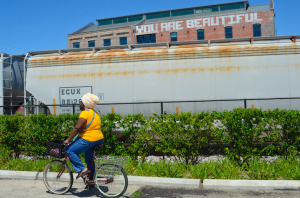 Women, Trans, and Femmes bicyclists were reassured regarding their place in the bicycling community last week at the San Diego Regional Bike Summit. Ringing in day one of the San Diego Regional Bike Summit, keynote speaker Adonia Lugo, author of Bicycle/Race: Transportation, Culture, & Resistance led attendees on a journey through culture and mobility in Los Angeles. Lugo has spearheaded multiple projects across the nation, including but not limited to: advocating cycling for people of color and different socioeconomic backgrounds, strategizing multilayer approaches to urbanism with communities, and providing research so that “we create bridges between different bikers.” Her compelling concept of focusing on ‘core riders’ was one that opened discussions between attendees. Borrowing the term from the transit advocacy field, core riders “...are known to be the more frequent and regular users of transit. Such regular users make up most of transit usage. Transit planners should focus on core riders and those considered potential riders.” She continued to discuss that core riders also comprise those bicyclists that aren’t necessarily active in bicycle advocacy but need representation too. The concept of core bicycle riders is crucial to advocacy since they are the most prevalent users.
Women, Trans, and Femmes bicyclists were reassured regarding their place in the bicycling community last week at the San Diego Regional Bike Summit. Ringing in day one of the San Diego Regional Bike Summit, keynote speaker Adonia Lugo, author of Bicycle/Race: Transportation, Culture, & Resistance led attendees on a journey through culture and mobility in Los Angeles. Lugo has spearheaded multiple projects across the nation, including but not limited to: advocating cycling for people of color and different socioeconomic backgrounds, strategizing multilayer approaches to urbanism with communities, and providing research so that “we create bridges between different bikers.” Her compelling concept of focusing on ‘core riders’ was one that opened discussions between attendees. Borrowing the term from the transit advocacy field, core riders “...are known to be the more frequent and regular users of transit. Such regular users make up most of transit usage. Transit planners should focus on core riders and those considered potential riders.” She continued to discuss that core riders also comprise those bicyclists that aren’t necessarily active in bicycle advocacy but need representation too. The concept of core bicycle riders is crucial to advocacy since they are the most prevalent users.
Check her out at urbanadonia.com for more information on her research background and ongoing work.
Adonia Lugo also co-authored The New Movement Bike Equity Today.
Resilience on Wheels
The theme of representation for core riders continued at the "Resilience on Wheels" session. Four advocates discussed their sense of place on the streets, representing different generations, ethnicities, and gender identities.
Tez de la Tierra discussed their educational classes as a means to use biking ‘as a tool of liberation’ through QTIBIPOC Spirit Bike Tours/Rides in the LA and San Diego areas. They highlighted the strong connection that biking provides with mother earth by experiencing the complexity of landscapes in detail and being able to create strategies to heal from oppression. Sharing their journey with others provides resources to persons who might not have the courage to jump on a bike and cruise.
Karissa Bo Bissa is a local artisan and a member of the SheWolves for over four years. Her story was one that focused on the importance of community and inclusivity that allows women/trans/femmes to feel comfortable bicycling on the streets. Being a SheWolf, she now experiences no boundaries on where she can take her body and bike. Check out SheWolves Facebook Page or Website to see upcoming rides.
Cresencia Garibo is a living example that ‘el querer es poder’ (to want is the power to be able to), learning to ride a bike at 62 years young! Growing up in Mexico she would rarely see women biking since riding a bike was considered to be only for men. She dreamt of learning to ride a bike from a young age and her desire never receded. She now uses bicycling as a therapeutic release.
These speakers bear witness to how much more work needs to be done by bicycle advocacy and transportation justice organizations in the area of gender and diversity equity. It is important for people who have been oppressed to be able to use public spaces, including the street space and have active mobility choices because that is what makes urban life great. By supporting one another and physically showing up, new opportunities will become accessible for women, trans, and others who have not felt the courage to do so by themselves. A successful bike system would provide equal resources and inclusivity to those of different types of backgrounds. A diverse community can provide a wide range of ideas and topics to ultimately understand what a comprehensive system for all would be.
Women/trans/femmes are underrepresented in active mobility and public space, but the San Diego Regional Bike Summit beautifully highlighted the presence that does exist in the community, research, and grassroot movements.
BikeSD continues to celebrate diversity and community by Biking With Pride in this year's The Parade - San Diego LGBT Pride

